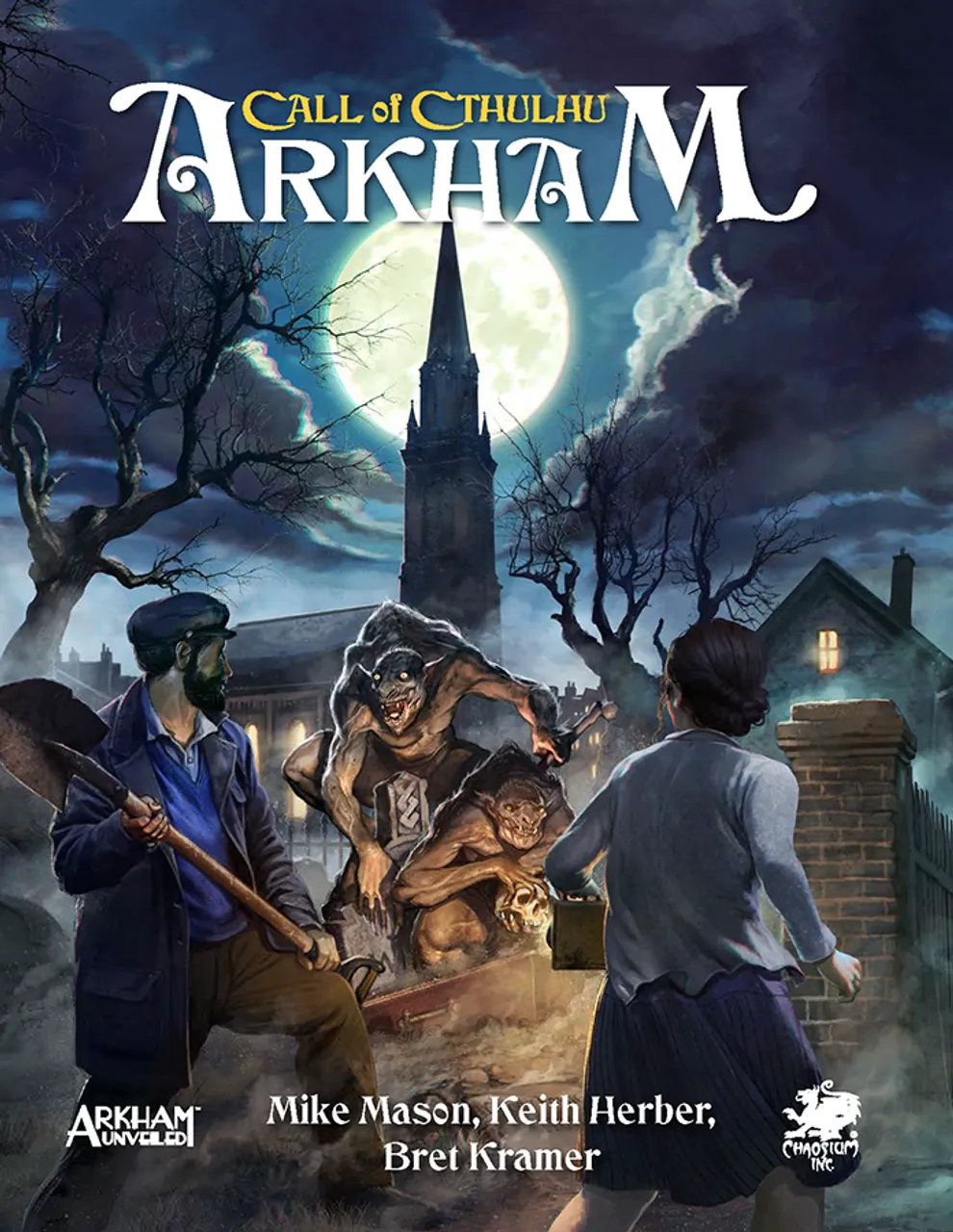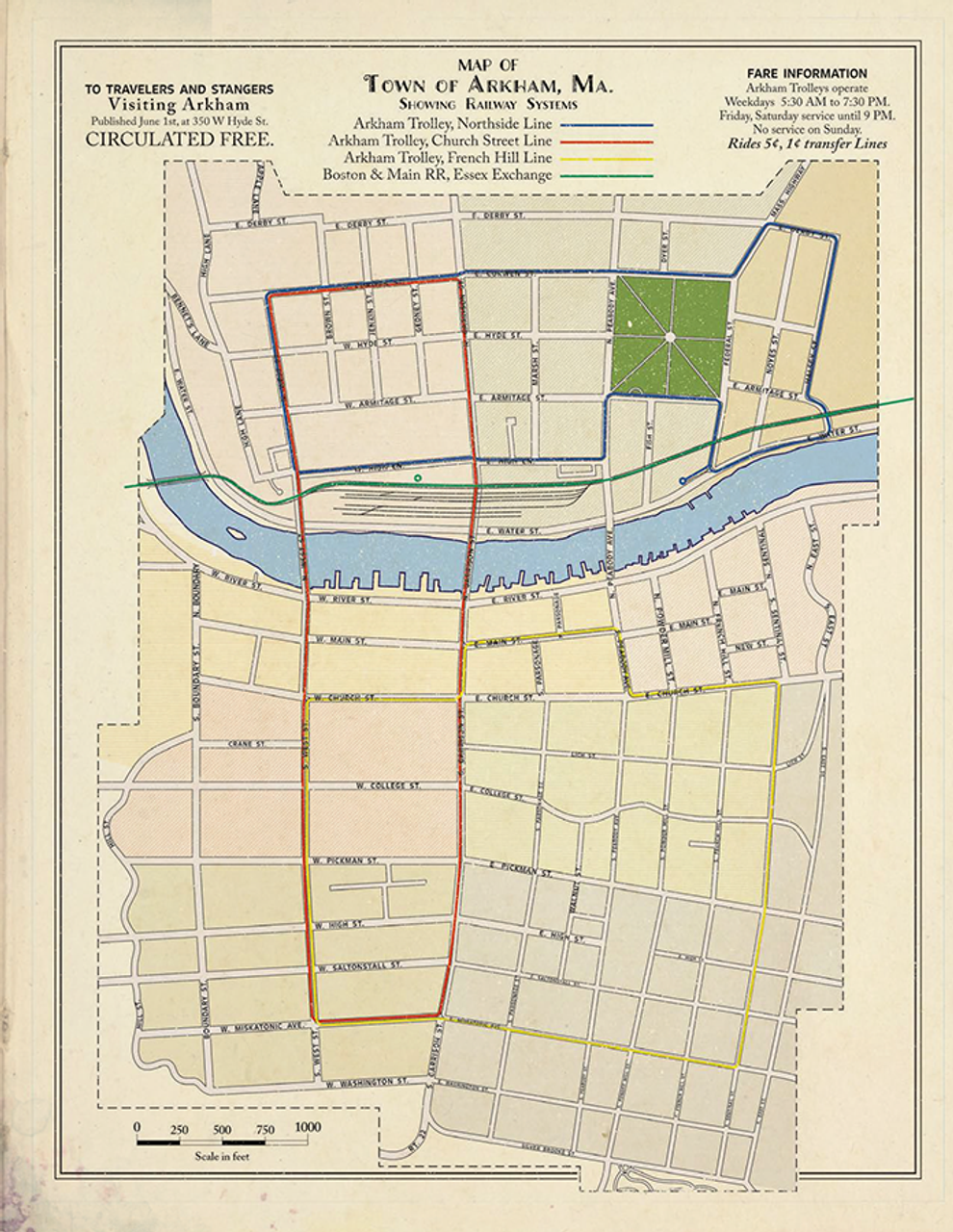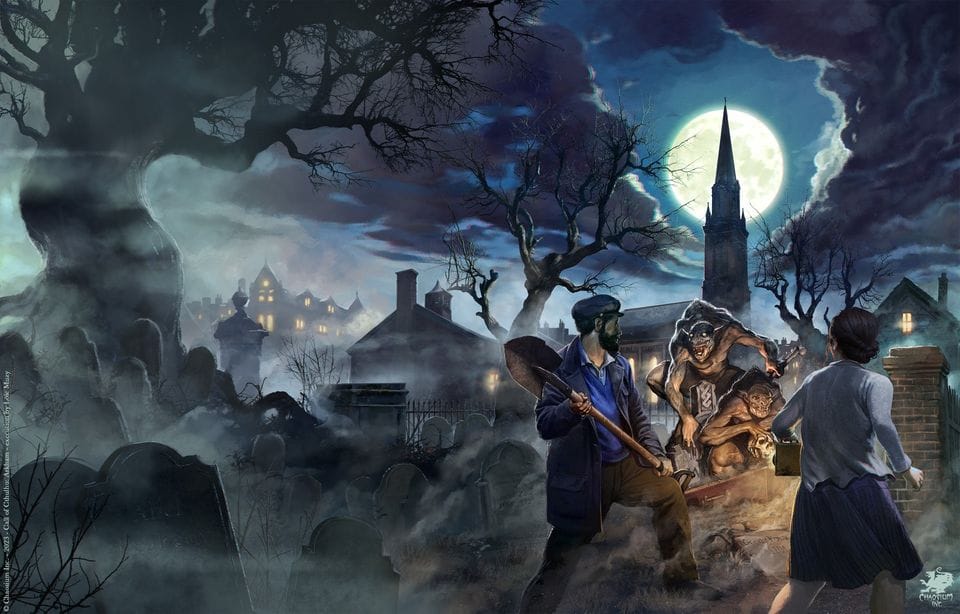
Call of Cthulhu is an interesting beast. If you enjoy games stuffed with wyrdness, set to a soundtrack of escalating fear, panic and terror, this may be the top of the mountain in RPG terms. Of course, if you don’t want that experience, you might feel a little constricted.
CoC is also unusual due to its foundations in Lovecraftian horror. This has provided the game with a rich bedrock of lore and narrative; but also an uneven one. The biggest H.P. Lovecraft fan in the world would have to admit that - even ignoring some of the racism, ableism and other transgressions - his output was not consistently brilliant.
Even more interestingly, there have now been decades of world-building in the setting; fleshing out the setting outside of Lovecraft’s canon. A key location mentioned in Lovecraft’s work is the fictional New England city of Arkham - yet it’s only the direct setting for approximately six of his short stories, and even within those, the specifics of its geographic area shift inconsistently around Northern Massachusetts. Contrast that with the idea today that we are discussing the fourth edition of a 150,000 word source book all about Arkham? It appears that, for this city, Call of Cthulhu’s derivative work may have actually become the primary authority on this aspect of Lovecraftian mythology.
Call of Cthulhu: Arkham is a source book on the city and area, giving Keepers everything they need to build their own version of the iconic setting. The beauty of sparse foundations and fluid in-game reality is that there truly is no wrong way to represent this setting, and the book aims to make fully flavouring your games as simple as possible. Simple stuff helps tremendously with that; such as CoC:A’s name and weather generators - my new Investigator is “Ms Hetfield Winthrop”, and she has a 70% chance of rain on her October birthday. Immediately I can visualise the bespectacled Madam, tutting under a firmly-held umbrella as her midday walk is ruined.
Appropriately there are content warnings about slavery, discrimination and, of course, quite a lot of horrible self-and-others-harm. Given the region, a decent effort is taken to include First Nations people in a balanced light, including the fictional Misqat people, and a similar commentary on African American residents in the East Town area. However, I didn’t find any mention or credit to a cultural sensitivity reader here. Now Chaosium may have hired someone and just not included their name, but I think it would have been an appropriate nod towards doing the right thing by industry leaders. If I can hire a Greenlandic reader for a comedy zine set at the North Pole that only made £300 on Kickstarter? Well, it should have been done here too.
Now, Arkham is a pretty traditional RPG supplement in most ways; a nearly three-hundred page A4 Hardback with a somewhat exhaustive level of detail. It might be a little dense if you just need to grab a few details, but it counters that with options like a lightweight chronology, generic NPCs for adapting on-the-fly and - my personal favourite - an absolutely killer index. Looking stuff up in rulebooks is the bane of my life, and this index is so comprehensive it’s practically Google. 10 out of 10!
Approximately eighty detailed NPCs are included, most with thoughtful touches of flavour and mechanics: for example, the bio of pilot and airfield owner Florence Harrington includes how much she charges for storing, flying and leasing planes. That’s Keeper insurance against the nonsense players commonly subject particular NPCs to in-game.
I particularly enjoyed the (nearly three hundred) locations in Call of Cthulhu - Arkham. Alongside a basic description of the place, there are sections for “Notable Folk”; which includes some as minor NPCs, and others with links to more detailed stats and biographies. Most locations have both a History section, and then Strangeness, with so many odd goings-on and mysterious happenings that it’s unlikely anyone in the town would ever have the time to get anything worldly done. The high-quality, well-keyed maps make navigation feel like a real world experience; a fully fleshed-out University with departments was the cherry on top.

Co-author Keith Herber wrote the keystone Edge of Darkness scenario in the game’s starter set, so I had hoped for a little more in the way of a campaign structure or even adventure seeds in the book. The Rumours & Gossips tables provides some nuggets to explore at the table, but overall the entire book is a really rather detailed sandbox of the city and its neighbourhoods and inhabitants. That’s no bad thing, and will perfectly suit more traditional Keepers who enjoy prep almost as much as play.
Perhaps I’m spoiled by the incredibly accessible setting books for Tales From The Loop, but for my money, I’d have liked to see just a few pages devoted to a starter adventure, grabbing at the many available threads dangling from the sections in this book; or maybe a section entitled “How to pull all this information into a plotline”. Such an idea doesn’t take away from the source material, and it needn’t be lengthy; but it would be a great aid to Keepers feeling daunted by the scale of the city sprawling across these pages.

Layout is lovely, and hits the spot thematically; much of the art is absolutely on the mark for 1920s oil paintings, often with a hint of Impressionist techniques; an attention to detail I appreciated. The writing is concise and flavoursome, “Virgilio ‘Big Red’ Scavo, 49, is the manager; a portly fellow with a stare that could kill”. That said, my first typo discovery was in paragraph one of the introduction, with another to pair it in the final sentence. How do these mistakes make it into professionally edited hardbacks?!
As a Keeper and a Player, there’s a functionally unlimited amount to explore in Call of Cthulhu: Arkham; you could live in this cursed city for years. I do still feel the job of turning this into “an adventure setting” rather than just “a setting” though is left mostly up to me. The closest to adventure seeds are the What’s Going On? sections provided in some locations; but to really pull those together would still require someone to have knowledge of nearly the whole book at once.
The excellent Odd Jobs by MacGuffin Press manages to fit entire, eclectic settings, a campaign, and multiple one-shots and micro-seeds into ten or so pages: I don’t think it’s too much to ask that a flagship release for one of the biggest TTRPGs in the world does the same.
Writing: Mike Mason, Keith Herber, Bret Kramer
Publisher by Chaosium
This feature originally appeared in Wyrd Science Vol.1, Issue 6 (August '24)

